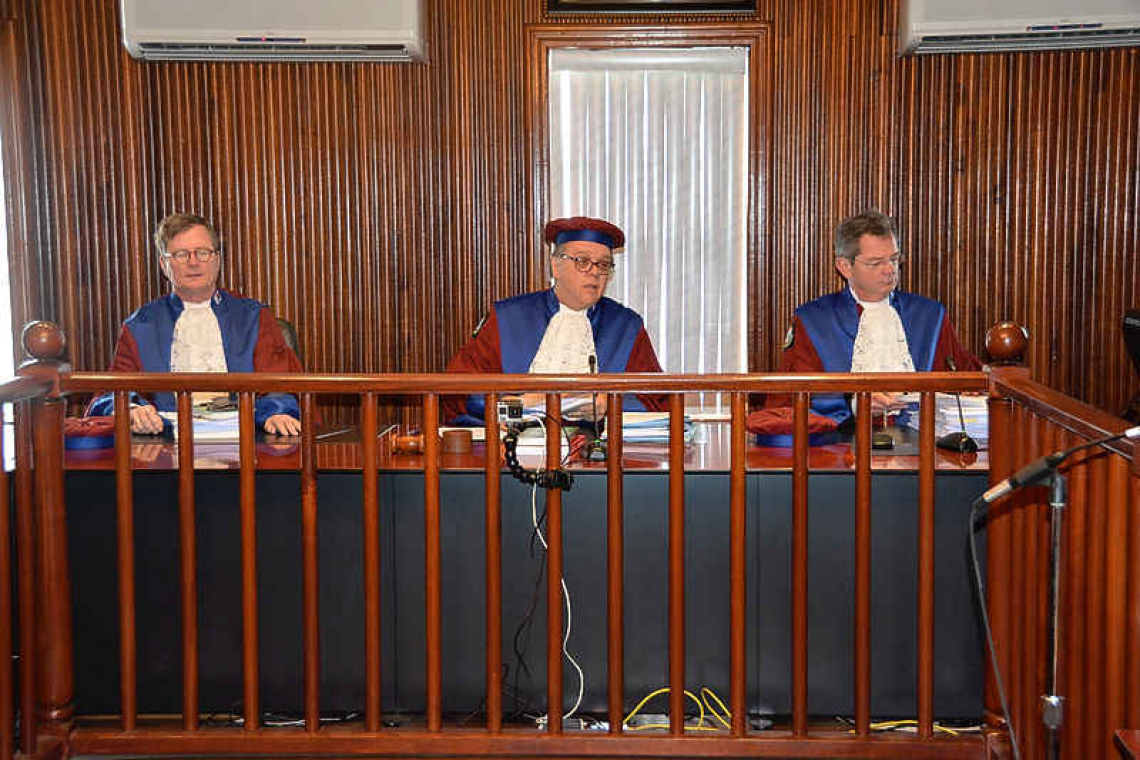The three-judge panel
PHILIPSBURG--The Constitutional Court will be hearing the case filed by the Ombudsman of St. Maarten April 26 for review of three national ordinances in connection with cuts to the employment benefits of all (semi-) public sector workers, at the Courthouse on Friday, August 20.
The three contested national ordinances are the Temporary National Ordinance on COVID-19 cuts, Temporary National Ordinance to amend the terms of employment of political authorities and Temporary National Ordinance on the standardisation of top incomes and adjustment of employment conditions at (semi-) public sector entities.
The Ombudsman of St. Maarten as the “Guardian of the Constitution” has the authority to challenge newly ratified laws which the Ombudsman considers to be in contravention of the Constitution.
Although the specific arguments for the challenging of the individual national ordinances differ slightly, the grounds are incompatibility with Article 15 of the Constitution concerning the undisturbed enjoyment of property, and incompatibility with Article 16 of the Constitution, the equality principle.
The right to undisturbed enjoyment of property, which has been more broadly codified under the term possession in Article 1 of the First Protocol of the European Convention on Human Rights (ECHR), includes salary, pension and employment benefits, among other things.
An interference with the right to the peaceful enjoyment of “possessions” must, therefore, apart from being prescribed by law and in the public interest, strike a “fair balance” between the demands of the general interest of the community and the requirements of the protection of the individual’s fundamental rights.
The austerity measures implemented by these laws include the reduction of vacation days, the elimination of vacation allowances and any salary increases on any grounds for an indefinite period. These austerity measures that eliminate and/or reduce an individual’s fundamental rights have been submitted to the Constitutional Court for review.
The Ombudsman will also argue that the measures are incompatible with the non-discrimination principle. The primary motive for the cuts to the employment conditions of all (semi-) public sector workers was to be in solidarity with employees outside of the public sector who, as a result of the economic downturn due to COVID-19, had to endure a reduction in salaries and/or loss of employment.
“On the one hand, the national ordinances make a broad stroke by including workers of organisations/companies in which government is a (majority) shareholder and on the other hand, exclude certain public sector entities. The solidarity motive and the decision on which ‘public sector’ workers to include also gives cause for concern,” according to the Ombudsman.
Based on the mentioned grounds, the Ombudsman has requested that the Constitutional Court quash all or part of the three national ordinances.
A statement of defence in these proceedings was filed by the government on June 22. A reply will be submitted by the Ombudsman’s attorneys July 13, followed by a written duplication by the government’s lawyers on July 28.
The Constitutional Court has enough judges to handle this case, but is not yet at full capacity as there are some vacancies to be filled. This is expected to happen in the not-too-distant future. However, the Constitutional Court said it was not in a position to make any statements about the appointment of judges.
The additional appointments must take place by national decree in accordance with the provisions of Article 128 of the Constitution and Chapter 1 of the National Ordinance on the Constitutional Court.
The Ombudsman is being represented in these court proceedings by attorneys Jason Rogers and Nancy Joubert of the Hoeve and Rogers law firm. Rogers confirmed that parties are currently involved in the written exchange of arguments.
Government is represented in these proceedings by attorney-at-law Richard Gibson Jr. of law firm Gibson and Associates.







